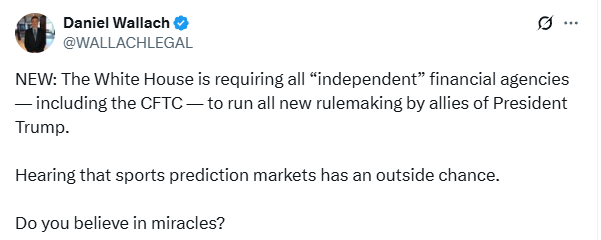Mountains and Molehills
A year-old comment from ESPN's Rece Davis highlights tensions over gambling remarks, but is it a serious threat or unnecessary drama over a harmless joke.
The Bulletin Board
THE LEDE: Rece Davis’s “risk-free investment” comment is back in the spotlight.
BEYOND the HEADLINE: Sometimes we lose sight of the bigger picture.
ROUNDUP: CFTC Roundtable; AZ targets sweepstakes and offshores; NE OSB bill update; DK pauses prediction filing.
VIEWS: Will a Trump EO help or hurt Kalshi’s prediction market case?
VIEWS: Pennsylvania interstate poker imminent, is Connecticut next?
AROUND the WATERCOOLER: More great analysis from Andrew Kim.
STRAY THOUGHTS: The message.
SPONSOR’S MESSAGE - Underdog: the most innovative company in sports gaming.
At Underdog we use our own tech stack to create the industry’s most popular games, designing products specifically for the American sports fan.
Join us as we build the future of sports gaming.
Visit: https://underdogfantasy.com/careers
The Lede: MGC Revisits a Year-Old “Controversy”
More than a year after the incident, the Massachusetts Gaming Commission held an adjudicatory hearing on comments made by ESPN’s Rece Davis. The incident stems from the College Gameday host’s offhand comment after ESPN BET’s Erin Dolan offered her “best bets” of the day.
So what did Davis say?
“You know what? Some would call this wagering, gambling,” Davis said. “The way you've sold this, I think what it is, is a risk-free investment.”
Davis later clarified that it was meant as a joke on X:
“During a segment this morning on College GameDay, due to ESPN Bet picks hitting yesterday, I joked the advice was more like “risk-free investing.” As we all know, such a thing does not exist. Obviously, there are risks. Though I’m not a gambler, I strongly encourage those who do partake, do so with prudence, care, caution, fiscal and personal responsibility and never over-extend. Sports are unpredictable. Wagering is tricky. So let’s agree to manage monetary risks appropriately. I’m sure most recognized my comment was tongue-in-cheek. Just to clarify.”
He also made a point to say he didn’t apologize on a subsequent appearance on the Pat McAfee Show.
During the adjudicatory hearing, MGC Commission Eileen O’Brien was disappointed by the original remarks and didn’t care for the not-an-apology follow-up.
“We’ve had this conversation before, to define reasonable person,” Commissioner O’Brien said, pointing out her belief that there can be a vast divide between what is reasonable to someone with experience betting on sports and what is reasonable to someone outside the sports betting bubble.
The MGC did not render a decision or impose a penalty, so this seemingly trivial matter remains… to be continued.
Beyond the Headline: Time to Remove the Blinders
Was Rece Davis’s joke inartfully worded? Yes. Did it cause any harm? Do I even need to answer that question?
It’s hard to imagine someone watching the segment and then downloading a sports betting app to place a wager, given that Davis said Dolan did a good job making the case for her bet.
Isn’t a quick dressing down by a producer saying, “don’t do that again,” a better resolution than a year-plus process to figure out what to penalize the sportsbook that is partnered with Davis’s employer?
It’s frustrating to see these types of issues take up so much of the limited oxygen in the room. Sometimes regulators get bogged down in the minutiae, but unfortunately, regulators are often hindered by laws and regulations governing sports betting, as well as outside forces that perceive every misstep as a sign of impending doom.
We need to stop holding Inquisitions to get to the bottom of every misstep and spend that time focused on serious topics — the MGC’s inquiries into limiting and VIP programs being a solid place to start. I’m not saying disregard small mistakes, but we certainly don’t need to waste an inordinate amount of time on them.
The industry and regulators are facing numerous significant threats and problems, and the distractions caused by these issues are enough to make people throw their hands up in the air and declare, “I can’t help you.”
As I noted when the MGC spent 50+ hours on adding the words 21+ to in-stadium advertising — which will have zero impact on anything:
“The MGC revels in circling back to topics and going into the weeds, and the 21+ issue is a great example of this. Commissioner Jordan Maynard even noted the amount of time (he guessed 50+ hours) that has been spent on this trivial topic.
Responsible gambling consultant Jamie Salsburg has also highlighted the trivial nature of 21+ logos, “Once again, I'll highlight that we are spending hours and hours on this display of "21+" next to a logo...while there is a growing list of issues that are much more worthy of attention going unnoticed.”
Milk occasionally gets spilled; wipe it up and move on. Not every infraction needs to be debated until the end of time. The Davis comment is a verbal warning level offense: “If you do that again, we will have to take action against you.”
Roundup: CFTC Roundtable; AZ Hits Sweeps; NE OSB Bill Advances; DK Pauses Prediction Filing
CFTC Roundtable update: According to Sportico’s Dan Bernstein, the CFTC roundtable is growing in scope — Bernstein also said it is expected to be livestreamed to the public:
Arizona is the latest state to instruct offshore and sweepstakes sites to cease operations [Press Release]: The Arizona Department of Gaming (ADG) announced that it sent cease-and-desist letters to seven operators last week — a mix of offshore sites and sweepstakes. “The active operations of these companies and online websites in Arizona are alleged to be felony criminal enterprises, and each operator has been directed to desist from any future illegal gambling operations or activities of any type in Arizona,” the letter reads. In addition to receiving C&D letters in Michigan, Pennsylvania, Delaware, and Maryland, 11 states have introduced legislation to prohibit sweepstakes; however, as the SPGA has pointed out, none of these bills have passed.
Nebraska sports betting bill takes another step forward [Sports Betting Dime]: Don’t look now, but a second mobile sports betting bill is getting closer to the finish line. The Nebraska Senate approved LR20CA by a vote of 27-16 last week. The bill, sponsored by State Sen. Elliot Bostar, would legalize mobile betting via constitutional amendment. Nebraska rules require three successful votes for the bill before it can be sent to Gov. Jim Pillen’s desk, and then, if signed, go before the voters on the 2026 ballot.
DraftKings withdraws derivatives application [Bloomberg]: “DraftKings has withdrawn an application for a license to sell derivatives,” per reporting by Bloomberg. The status of the application from DraftKings, reported by Dustin Gouker on March 10, was listed as pending with the National Futures Association since July, but was pulled days after Gouker’s report in March, per Bloomberg.
Views: White House Involvement Could Complicate CFTC’s Prediction Market Rules
Daniel Wallach has dug up another potentially interesting angle in the prediction market battle.
The executive order Wallach is alluding to was signed by President Trump on February 14, 2025. The EO requires independent agencies, such as the CFTC, to submit all new significant rulemakings to the White House’s Office of Information and Regulatory Affairs (OIRA), which is part of the Office of Management and Budget (OMB), for review to ensure they align with the administration’s priorities.
That should be good news for Kalshi, considering Donald Trump Jr.’s role as a strategic advisor and Trump’s nomination to head the CFTC, Brian Quintenz, being a Kalshi board member — Quintenz previously made comments in favor of sports markets being commodities under the purview of the CFTC:
“When we think of commodities, we think of tangible things. Oil, corn, gold. But what about an event? An election? Whether the Summer Olympics will occur in Japan? A football game? Those, too, are commodities!… All events are commodities, which means all contracts on future events are commodity futures contracts, which means all future event contracts need to be traded on a regulated and registered futures exchange.”
However, given the political climate, the EO is likely to face legal challenges as it conflicts with the traditional independence of these agencies.
On one hand, the Trump administration’s pro-innovation and deregulatory stance could create a more favorable environment for these markets, potentially leading to faster approvals or lighter regulations. On the other hand, political interference, legal challenges, and regulatory uncertainty could complicate the process.
We know where Quintenz stands, and acting Chair Caroline Pham is also sympathetic to Kalshi’s cause based on previous comments, although not to the same extent as Quintenz. But there are three other commissioners to consider. Quintenz has yet to be confirmed by the Senate.
The current CFTC Commissioners are:
Acting Chairman Caroline D. Pham (Republican)
Commissioner Summer K. Mersinger (Republican)
Commissioner Kristin N. Johnson (Democrat)
Commissioner Christy Goldsmith Romero (Democrat)
SPONSOR’S MESSAGE: 300 million bets researched. Every major sportsbook. One leading platform.
Outlier is the go-to research tool for serious bettors, and we’re looking for partners ready to share in our success. You have the reach, we have the product. Let’s win together.
Inquire at Partners@Outlier.bet
Views: Interstate Online Poker, Is Connecticut Next?
Pennsylvania is on the cusp of joining the Multi-State Interstate Gaming Association (MSIGA), joining current members Nevada, New Jersey, and Michigan. Delaware and West Virginia are also MSIGA members, but neither currently has any online poker operators.
With the addition of Pennsylvania, the population pool of MSIGA states will increase to roughly 35 million — a solid, yet unspectacular, player pool to draw from.
A key question moving forward is whether Pennsylvania will lead to online poker operators launching in West Virginia, or Rush Street Interactive (which holds a monopoly in Delaware) reviving online poker in the state — 888 offered online poker in Delaware, but RSI hasn’t launched an online poker product after taking over the Delaware contract from 888.
And then there is Connecticut, another state that has legalized online poker, but doesn’t have any active operators. Legislation, SB 1464, is moving through the Senate, having passed the General Law Committee and now awaiting consideration on the Senate floor. SB 1464 would allow Connecticut to join the Multi-State Internet Gaming Agreement (MSIGA) and create wagering limits (left undefined) on online sports bets.
Around the Watercooler
Social media conversations, rumors, and gossip.
It all comes down to one thing, according to Andrew Kim, a partner at Goodwin Law, who has been effectively analyzing the legal aspects of prediction markets.
“There is only ONE issue on the table: whether *both* the CFTC and state gaming regulators may regulate "contracts involving gaming," or whether the CFTC rides solo. That's it. That's the ballgame.”
As Kim notes, the fight isn’t over words, because at the end of the day, if the CFTC is the regulator, they get to decide the definitions of those terms.
By the same token, Kim writes that “whether the contracts are prohibited under 17 C.F.R. § 40.11” doesn’t matter either, because that will once again be the CFTC’s call.
And when it comes to conflicts with other federal laws, “The states can try to make the argument that exclusive CFTC regulation can't be squared with all these other laws,” Kim said. “I think that's a hard argument to make, for any law except IGRA, because none of the other laws focus on the word 'gaming.’”
Kim will be a guest on the Straight to the Point Talking Shop Podcast very soon, and was a guest on Bostonian vs. the Book last week:
And just to put another log on the fire, Daniel Wallach has raised yet another question, asking, is Kalshi guilty of “unclean hands” that would bar preliminary injunctive relief?
“The doctrine of “unclean hands” bars equitable relief “when the party seeking relief is guilty of fraud, unconscionable conduct, or bad faith directly related to the matter at issue that injures the other party and affects the balance of equities.”
“Here, a state could argue that Kalshi has “unclean hands” because it falsely certified to the CFTC that its sports-related event contracts comply with CFTC Regulations, with full knowledge that Rule 40.11(a)(1) prohibits event contracts relating to “gaming” and after having asserted in two prior judicial proceedings that the “gaming” category includes sports-related event contracts (like the ones here).”
Stray Thoughts
In music, you can talk about anything, sex, drugs, death, absolute nonsense, or literally anything, but as long as the music is upbeat and gets people moving, it doesn’t matter. People will happily sing along to songs like People Who Died, by the Jim Carroll Band, Pumped Up Kicks by Foster the People, or pretty much anything by Offspring. Music can be both incredibly dark and relentlessly bright.







